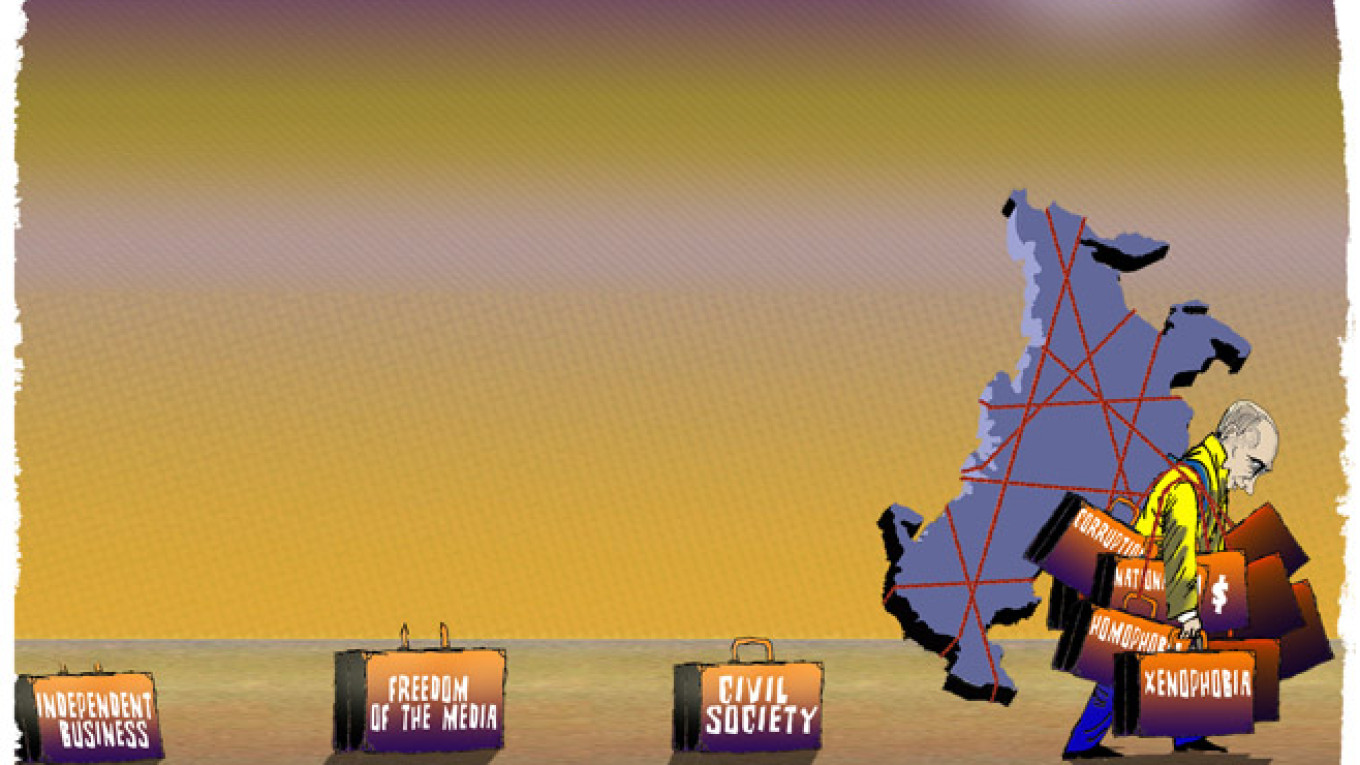The Russian media recently celebrated, rather modestly, an anniversary of great significance in the history of this country. Fifteen years ago, on Aug. 9, 1999, former President Boris Yeltsin made the decision to name Vladimir Putin as his successor.
Putin, at the time chief of the Federal Security Service, was appointed acting head of the Russian government and then simply prime minister several weeks later. Meanwhile, Yeltsin completely stepped into the background, handing over the reins of government to Putin.
Aug. 9 is therefore a very important date because it marks the day the KGB came to power in Russia. In the time since, Putin has destroyed the country's civil society, freedom of press and independent business, and is on the way toward making Russia a global outcast.
The '90s turned out to be the last time that Russian society would attempt democratic development. There are no signs that this attempt will ever be repeated. It looks like inertia will keep the country traveling down the paths Putin has created, perhaps even after he is gone.
The move away from democracy happened gradually, and each step was connected with blood.
Literally the day after Putin was appointed, war in the Caucasus broke out again, this time in Dagestan. Two weeks after his appointment, a bomb went off near the Kremlin, in the Okhotny Ryad shopping center, injuring 40. A month after he was appointed, apartment buildings were blown up with inhabitants sleeping inside in Moscow, Buinaksk and Volgodonsk; 300 people were killed.
Two months after his appointment, a full-scale war began in Chechnya that would continue for 9 1/2 years and take the lives of 6,000 Russian soldiers and 20,000 Chechen separatists. Accurate figures for civilian causalities are hard to come by, but they likely number in the tens of thousands.
The shocked and fearful public approved of the tough attitude Putin displayed in televised statements regarding these events. Against the backdrop of these bloody circumstances, Putin's approval shot up to a level that neither Gorbachev nor Yeltsin could have dreamed of, even before the early elections. Then Yeltsin retired on New Year's Eve, and Putin officially took over the office of the president.
Putin started his first four-year term with an attack on independent media (the first victim was broadcaster NTV), and ended it by eliminating gubernatorial elections. Regional leaders were then appointed personally by the president instead of being chosen by the populace, as they had been under Yeltsin. The direct election of Federation Council members was also eliminated.
These revolutionary changes to the constitution were also implemented with the help of support gained from a tragic event; at the start of September, terrorists took a school in Beslan hostage. The unsuccessful operation to free the hostages ended in the deaths of 330 children.
Against the backdrop of Russians' fear and anxiety, the mechanism of Russian business has also changed drastically under Putin's rule. The biggest corporations are now controlled by his personal friends, mostly former KGB officers. State-owned energy firm Gazprom has practically become Putin's personal company.
Nor has Putin neglected other areas of life. Everything he turns his attention to is immediately placed under the management of people with ties to the former KGB. Governors, ministers, whole industries, ports and railroads … Even the Russian children's rights ombudsman, Pavel Astakhov, is a former member of that organization. It's not surprising that he was the one tasked with abolishing foreign adoptions of Russian orphans, meaning that 100,000 children in orphanages won't be able to find loving families abroad.
Putin's staffing policies are based on the principle of "loyalty in return for corruption." Bureaucrats in the government, law enforcement and military are practically granted the right to steal and forbidden just one thing: criticism of the president.
Those fighting corruption are sent to prison and prosecuted in independent courts. Whistleblower Sergei Magnitsky was killed in prison, and opposition leader Alexei Navalny, who is facing six criminal charges, is under house arrest. Meanwhile, former Defense Minister Anatoly Serdyukov escapes punishment for corruption.
The biggest consequence of these 15 years, however, is that Putin has managed to corrupt the people of Russia themselves, instilling them with fascist values and ideals. Sociological studies show a frightening degree of support for xenophobia, homophobia and extreme nationalism.
Like everything under Putin, this was also a gradual process: First atheists were characterized as second-class citizens, then homosexuals; and then Crimea was taken and annexed and war unleashed in Ukraine. These are all links in the same chain. And the first one was forged 15 years ago on Aug. 9, 1999.
Andrei Malgin is a journalist, literary critic and blogger.
A Message from The Moscow Times:
Dear readers,
We are facing unprecedented challenges. Russia's Prosecutor General's Office has designated The Moscow Times as an "undesirable" organization, criminalizing our work and putting our staff at risk of prosecution. This follows our earlier unjust labeling as a "foreign agent."
These actions are direct attempts to silence independent journalism in Russia. The authorities claim our work "discredits the decisions of the Russian leadership." We see things differently: we strive to provide accurate, unbiased reporting on Russia.
We, the journalists of The Moscow Times, refuse to be silenced. But to continue our work, we need your help.
Your support, no matter how small, makes a world of difference. If you can, please support us monthly starting from just $2. It's quick to set up, and every contribution makes a significant impact.
By supporting The Moscow Times, you're defending open, independent journalism in the face of repression. Thank you for standing with us.
Remind me later.


